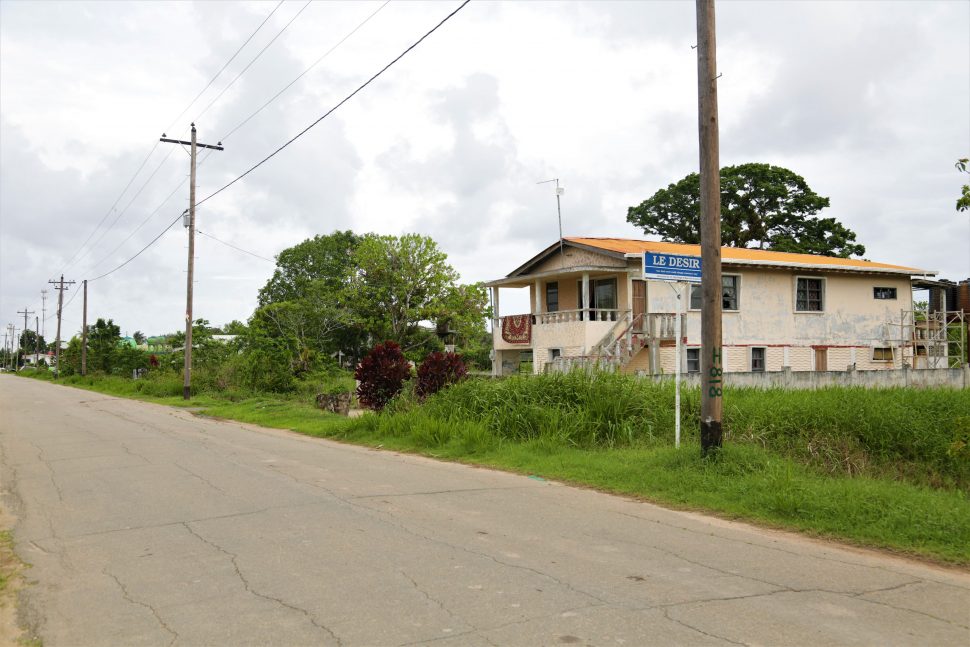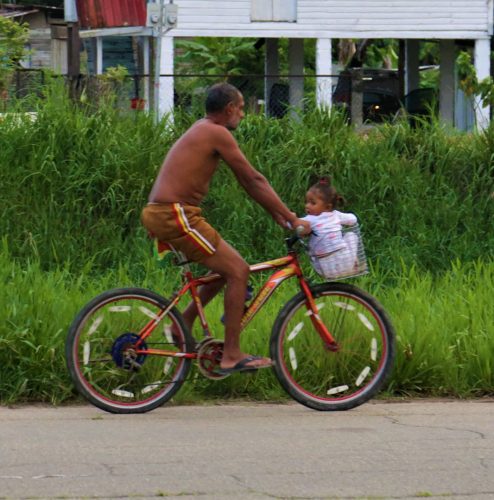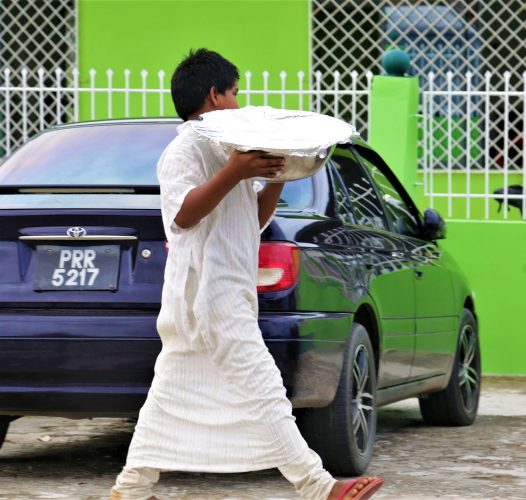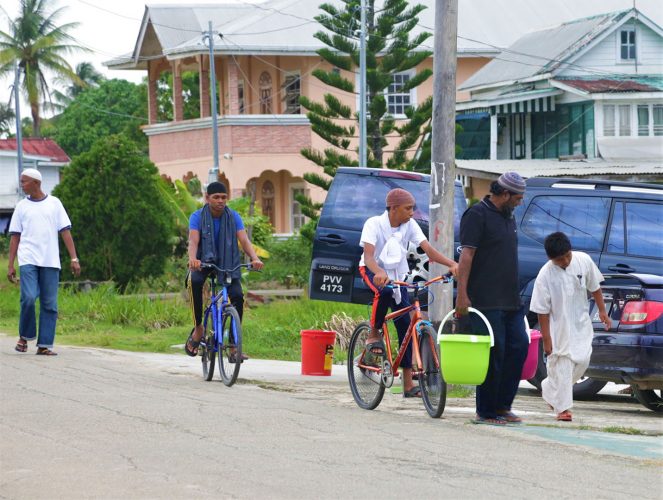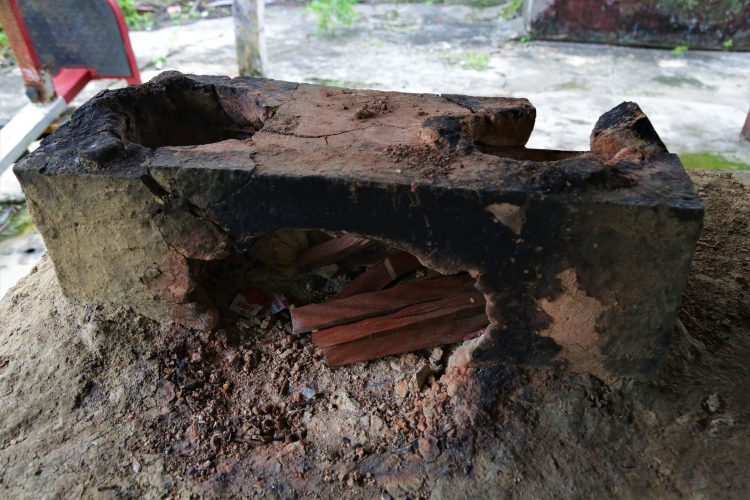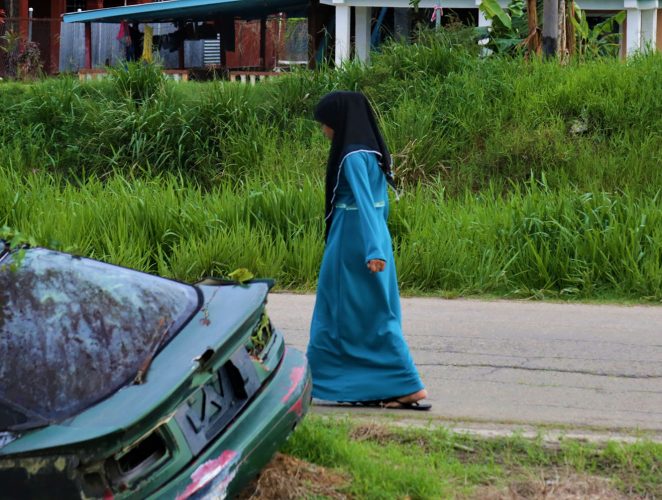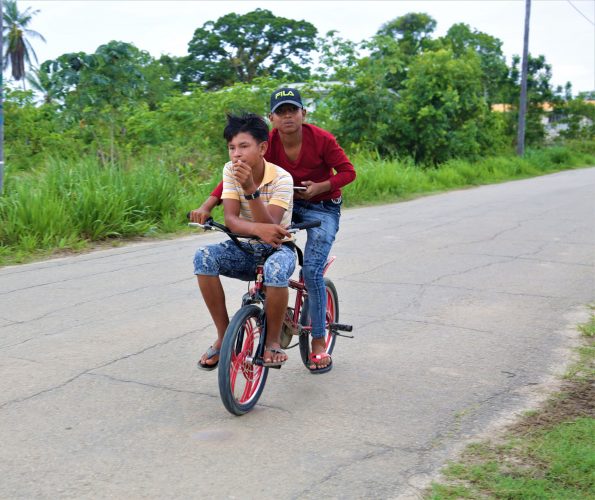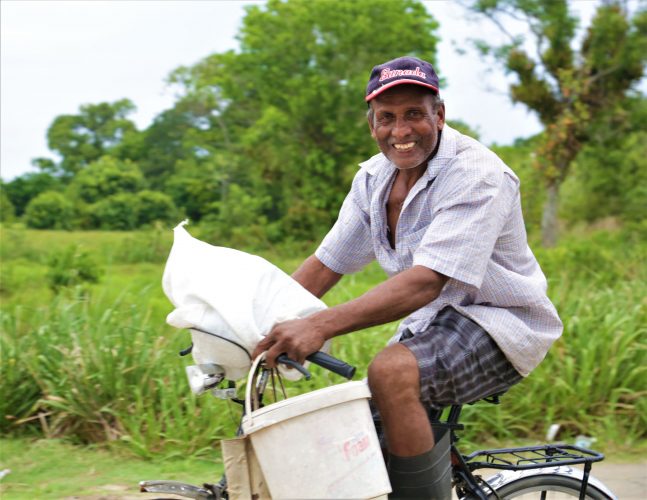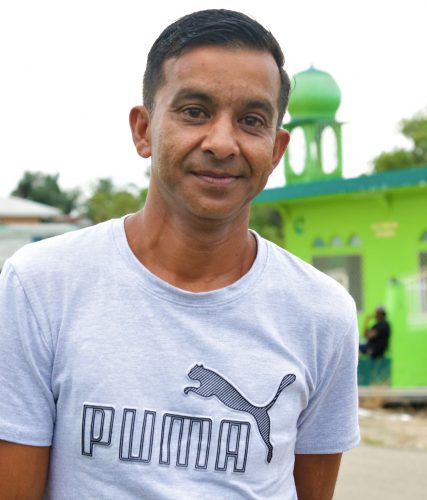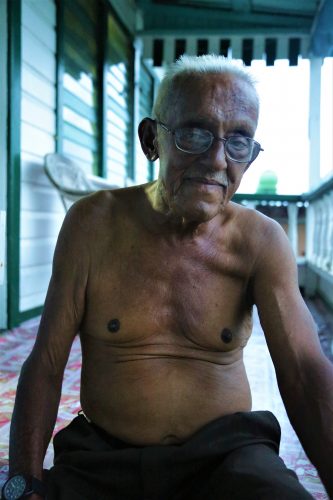Le Desir is home to a handful of families, most of whom are related and belong to the Islamic faith. The village, sandwiched between Jacoba Constantia and Anna Catherina, is situated along the Canal Number One Road.
When I visited, Le Desir seemed a gloomy place until later in the afternoon when residents of neighbouring villages arrived to break their Ramadan fast. Men scurried about with buckets of drink and young boys carefully handled basins as they made their way to the mosque, each of them wearing a woven taqiyah (skull cap). Women wore modest apparel and hijab. Everyone was ensuring they got to the mosque before Azaan (the Muslim call to worship).
“My grandfather founded Le Desir,” Ryan Shakoor said. “He had a coffee estate here and employed a number of persons to work for him. His name was Shakoor. The land in the village was given to his children, many of whom have migrated abroad. Some of the land still belong to my relatives while some has been sold or leased.”
Ryan Shakoor spent his early years in the village and migrated with his family to Canada when he was 14. Now he visits every year. Sharing his of what it was like decades before, he chuckled, “I was a troublemaker. My boyhood was great. We had lots of cows and after getting home from school we would go in the backdam and eat cane and mangoes and lots of fruits. I didn’t do much caretaking when it came to the cows except for giving them water and running them this way or that way. We had a cricket field at the back where we played cricket. A lot has changed since then. It was more populated then, Le Desir. There used to be a house here and there, almost on every lot.”
He attended Two Brothers Primary School and he and everyone else walked. He was fortunate enough to have a pair of boots for school. Not many of his friends at the time did. People made their living mainly by farming, including cattle rearing.
The land where the mosque stands was donated by his grandfather also.
Shakoor said that having grown up in North America where coffee is in high demand, he believes that Guyana should return to planting coffee on a large scale. “I drink two to three cups of coffee a day,” he said.
Seventy-year-old Abdool Rahaman is the cousin of Ryan Shakoor and another grandson of the founder of Le Desir. Though retired and a pensioner Rahaman drives a taxi around the city. His designated spot for work is at the Bourda Market. “What am I going to do at home alone? June coming will be six years since my wife passed away,” he said.
Rahaman worked with the Guyana Fire Service in his earlier years, a career he began on December 1, 1970. Being a fireman meant having to work shifts and because there was no Demerara Harbour Bridge when he started, Rahaman travelled to Vreed-en-Hoop then across to Georgetown by ferry. This was not easy, and he subsequently left Le Desir and rented an apartment closer to his place of work.
Pointing out bunches of bananas on a table downstairs where his son and his family lives, Rahaman explained that they are apple bananas and were planted many years ago by his father. “Those trees, they don’t die like that unless if they get a disease,” he said. “Otherwise they always shooting up young suckers. When you plant it, from the first bunch, you cutting until you dead. Sweet fig and cayenne bananas, I can’t say the same. They grow it here, but it doesn’t survive for long. It’s harder to grow. You don’t get big bunches… if you get a bunch from the cayenne, by the next bunch it smaller.”
Speaking of his grandfather, Rahaman said the man had eight children; five daughters and three sons. He had a coffee estate where about 20 residents of Canal Number One worked. “He bought Le Desir Estate from a man named Edun. We used to call him [Edun] Manpower. The coffee estate was closed sometime after Guyana gained its independence. The land was divided among his children. Some of them sold their place or leased it out before they migrated so not everyone here is family. We have one family here I think that is from somewhere else but we all live good here. We live good with the people in the village opposite too. That village over there, many of them are Christians. When they have weddings, we cook for them. All the people of my village in the earlier days were all Muslims, some would have converted today.
“Le Desir is 550 rods into the backdam. It stops at another trench we call the B Line which was dug by the Dutch. My mother used to fetch water for the men who were digging.”
As it relates to development Rahaman said he would like to see Canal Number One Road fixed. While everyone is peaceful with each other regardless race, colour or creed, Rahaman believes politicians are trying to create a wedge. He asked that more interest be shown to those living along the same road and that they be allowed the same privileges.
At one home where papayas sat on a table, Kenneth Harrack lay resting in a hammock. The papayas, he said, came from Mahaica.
“I come in Canal here when I was [a toddler]. I hadn’t started nursery school as yet. My father belongs to Craig on the East Bank and my mother from a village up in the Demerara River. My mother’s parents moved out here for the sake of a better education for the family,” Harrack said.
Some years later, his parents separated and Harrack found himself being shuffled between the Grove and Two Brothers primary schools. His time at the schools did not last very long and before he was seven years old, he was already a school dropout.
Now a farmer, he plants at L’Oratoir, five villages before Le Desir. His life in farming began when his academic life came to a standstill and he began braving the hot backdam sun alongside his father and uncles. His father, though he had returned to Craig by then, had a farm to upkeep and so Harrack tagged along. He started as a water boy and graduated to moving bundles of cane and anything that the actual labourers needed to be moved. It was a difficult life for a boy, the man said.
“The children now have such a [luxurious] life,” he said. Today he plants pineapples and cane. The cane is taken to the Leonora estate by other farmers with trailers while the pineapples are sold at wholesale prices from his home.
Asked whether he was affected by the recent fires that scorched many farms in the area, Harrack said his farm is situated beyond where the fires were so it was not at all affected. The man said he works Sunday to Sunday. He goes to the backdam in the mornings, returns home before lunch and then goes back late in the afternoon when it’s cool.
Spotting a broken fireside, I asked whether his family prepared meals on it, but he said no; the fireside is an antique and it stands out because of its blackened, red clay colour.
“I like it here because it’s more quiet. I only wish now that they fix the road,” Harrack said.
